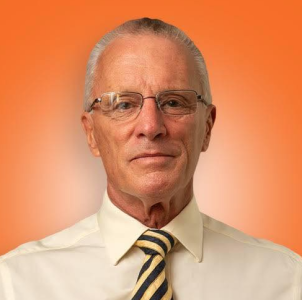Shock resignation triggers bold move: What it means for politics and you
By
Gian T
- Replies 0
Politics is never short of twists, but even the most seasoned watchers didn’t see this coming.
A sudden shake-up in the Senate has left many scratching their heads. One Nation’s newest NSW Senator, Warwick Stacey, resigned just months after his election.
If you’re wondering, 'Didn’t he only just arrive?' you’re not alone. The upper house has only sat for seven days this year, which makes his swift exit even more surprising. So what went down, and what could this mean for One Nation, Pauline Hanson, and everyday Australians? Let’s unpack it.
Senator Stacey’s time in Parliament was brief but certainly not uneventful. Citing personal health issues, he made the difficult decision to step down, saying: ‘Unfortunately, I will be unable to fully dedicate myself to the role as I deal with my health issues.
I don't think a person elected to Parliament should be anything less than completely dedicated to a role entrusted to them by voters, so I'm resigning to make way for someone who can do that on behalf of the people of NSW.’
It’s a rare show of political integrity—putting the needs of the electorate above personal ambition.
In an era where politicians are often accused of clinging to power, Stacey’s resignation is a reminder that public service is, at its core, about serving the public.
One Nation leader Pauline Hanson was quick to respond, offering her full support and admiration for the outgoing senator.
‘Warwick Stacey is a man of principle and a great Australian,’ she said. ‘It is with profound regret that we farewell him from the Senate so soon after he was elected.’
Hanson’s words reflect both disappointment and respect—a sentiment likely shared by many in her party.
But with Stacey’s departure, the party now faces the challenge of filling a casual vacancy in the Senate, a process that will require a joint sitting of the NSW Parliament to ratify his successor.
One Nation has promised to announce Stacey’s replacement in the coming weeks.
The process is more than just a formality; the new senator will need to hit the ground running, representing NSW and upholding the party’s values in a rapidly changing political landscape.
For those unfamiliar, when a senator resigns mid-term, their party nominates a replacement, who the state parliament must officially approve.
It’s a system designed to maintain the balance of power as decided by voters, but it also means that party leaders like Pauline Hanson have significant influence over who steps into the role.
Despite his short time in office, Stacey made headlines for his outspoken views—particularly his opposition to Welcome to Country ceremonies.
He turned his back on one such ceremony in the upper house, calling them ‘exercises in virtue signalling’ and arguing that they ‘keep disunity alive.’
‘The practice of welcome to country was invented in the 1970s. It and associated statements have become weapons in a culture war that seeks to divide Australia.
They imply the Australian nation is illegitimate. Australians are sick of these divisive culture wars from the radical left,’ Stacey said.
His comments sparked debate, highlighting the ongoing tensions in Australian society around issues of identity, history, and reconciliation.
Whether you agree or disagree, it’s clear that Stacey wasn’t afraid to speak his mind—a quality that will be missed by some and not by others.
For everyday Australians, especially those of us in the over-60s club, these political shifts can sometimes feel distant.
But the reality is, changes in Parliament can have real impacts on the policies and debates that shape our lives—from healthcare and pensions to cultural issues and national identity.
Stacey’s resignation also raises questions about the pressures faced by politicians, particularly those new to the job.
The demands of public life can take a toll on anyone’s health, and it’s a timely reminder that behind every headline is a human being.
With a new senator soon to be announced, all eyes will be on Pauline Hanson and her party.
Will they choose someone with similar views to Stacey, or will they opt for a fresh face with a different approach? Either way, the decision will shape the party’s direction in NSW and beyond.
 What do you make of Senator Stacey’s resignation? Should more politicians step aside if they can’t give 100 per cent? And what are your thoughts on the ongoing debates around Welcome to Country and national unity? Share your thoughts in the comments below.
What do you make of Senator Stacey’s resignation? Should more politicians step aside if they can’t give 100 per cent? And what are your thoughts on the ongoing debates around Welcome to Country and national unity? Share your thoughts in the comments below.
Read more: Peter Dutton reveals his pick for this controversial government position
A sudden shake-up in the Senate has left many scratching their heads. One Nation’s newest NSW Senator, Warwick Stacey, resigned just months after his election.
If you’re wondering, 'Didn’t he only just arrive?' you’re not alone. The upper house has only sat for seven days this year, which makes his swift exit even more surprising. So what went down, and what could this mean for One Nation, Pauline Hanson, and everyday Australians? Let’s unpack it.
Senator Stacey’s time in Parliament was brief but certainly not uneventful. Citing personal health issues, he made the difficult decision to step down, saying: ‘Unfortunately, I will be unable to fully dedicate myself to the role as I deal with my health issues.
I don't think a person elected to Parliament should be anything less than completely dedicated to a role entrusted to them by voters, so I'm resigning to make way for someone who can do that on behalf of the people of NSW.’
It’s a rare show of political integrity—putting the needs of the electorate above personal ambition.
In an era where politicians are often accused of clinging to power, Stacey’s resignation is a reminder that public service is, at its core, about serving the public.
One Nation leader Pauline Hanson was quick to respond, offering her full support and admiration for the outgoing senator.
‘Warwick Stacey is a man of principle and a great Australian,’ she said. ‘It is with profound regret that we farewell him from the Senate so soon after he was elected.’
Hanson’s words reflect both disappointment and respect—a sentiment likely shared by many in her party.
But with Stacey’s departure, the party now faces the challenge of filling a casual vacancy in the Senate, a process that will require a joint sitting of the NSW Parliament to ratify his successor.
One Nation has promised to announce Stacey’s replacement in the coming weeks.
The process is more than just a formality; the new senator will need to hit the ground running, representing NSW and upholding the party’s values in a rapidly changing political landscape.
For those unfamiliar, when a senator resigns mid-term, their party nominates a replacement, who the state parliament must officially approve.
It’s a system designed to maintain the balance of power as decided by voters, but it also means that party leaders like Pauline Hanson have significant influence over who steps into the role.
Despite his short time in office, Stacey made headlines for his outspoken views—particularly his opposition to Welcome to Country ceremonies.
He turned his back on one such ceremony in the upper house, calling them ‘exercises in virtue signalling’ and arguing that they ‘keep disunity alive.’
‘The practice of welcome to country was invented in the 1970s. It and associated statements have become weapons in a culture war that seeks to divide Australia.
They imply the Australian nation is illegitimate. Australians are sick of these divisive culture wars from the radical left,’ Stacey said.
His comments sparked debate, highlighting the ongoing tensions in Australian society around issues of identity, history, and reconciliation.
Whether you agree or disagree, it’s clear that Stacey wasn’t afraid to speak his mind—a quality that will be missed by some and not by others.
For everyday Australians, especially those of us in the over-60s club, these political shifts can sometimes feel distant.
But the reality is, changes in Parliament can have real impacts on the policies and debates that shape our lives—from healthcare and pensions to cultural issues and national identity.
Stacey’s resignation also raises questions about the pressures faced by politicians, particularly those new to the job.
The demands of public life can take a toll on anyone’s health, and it’s a timely reminder that behind every headline is a human being.
With a new senator soon to be announced, all eyes will be on Pauline Hanson and her party.
Will they choose someone with similar views to Stacey, or will they opt for a fresh face with a different approach? Either way, the decision will shape the party’s direction in NSW and beyond.
Key Takeaways
- One Nation Senator Warwick Stacey has resigned from the Senate for personal health reasons, just months after being elected.
- Pauline Hanson, One Nation leader, publicly expressed her full support and admiration for Stacey, calling him a man of principle.
- Stacey’s resignation has created a casual vacancy, with One Nation to announce its replacement in the coming weeks before a NSW parliamentary joint sitting to ratify the successor.
- During his brief tenure, Stacey notably criticised Welcome to Country ceremonies, arguing they promote division and calling them exercises in virtue signalling.
Read more: Peter Dutton reveals his pick for this controversial government position








